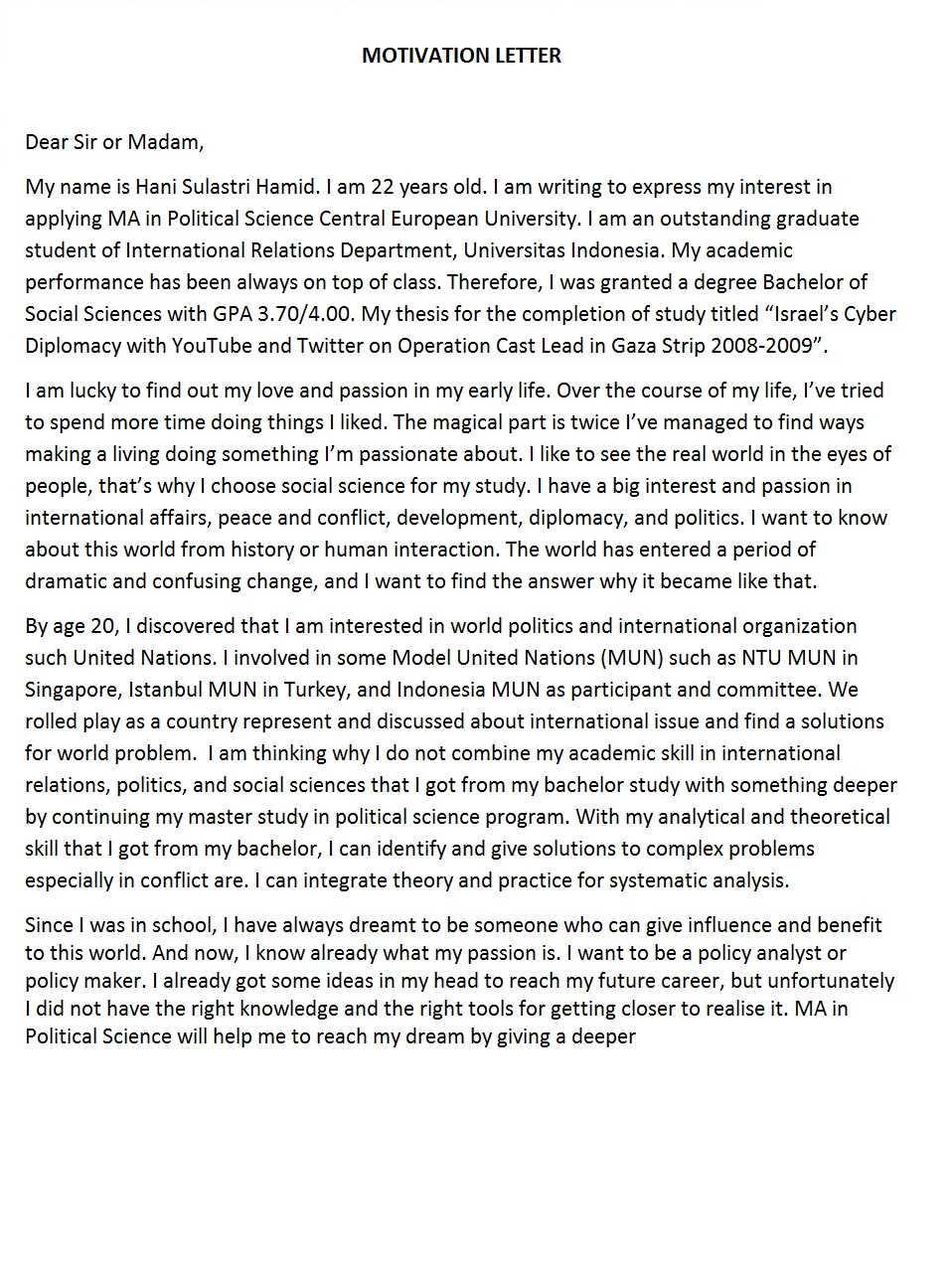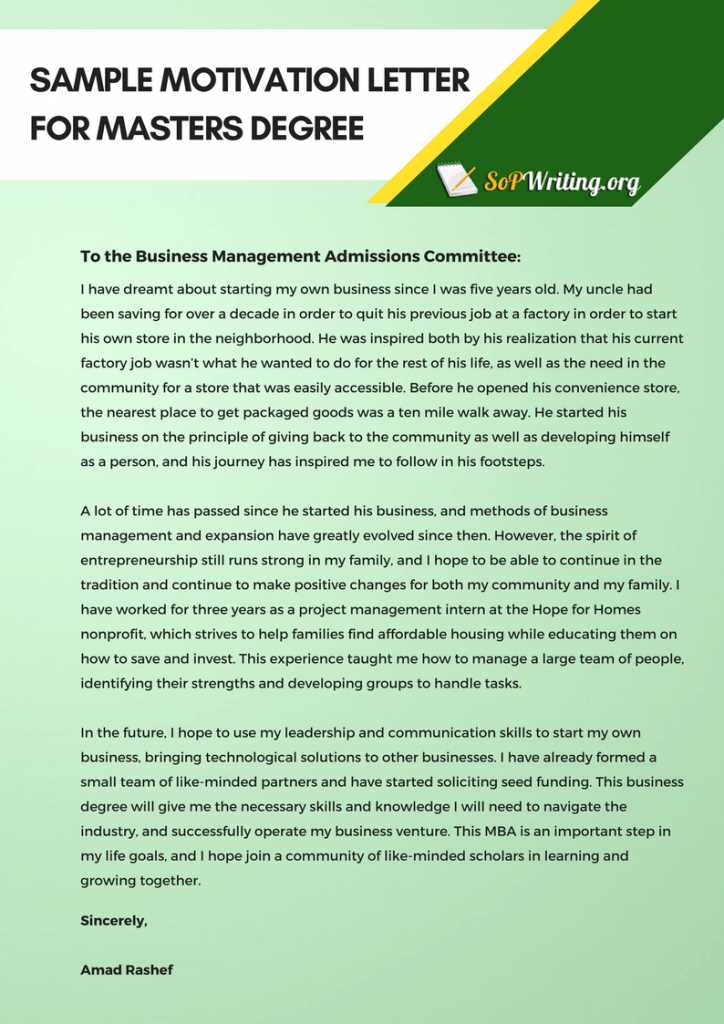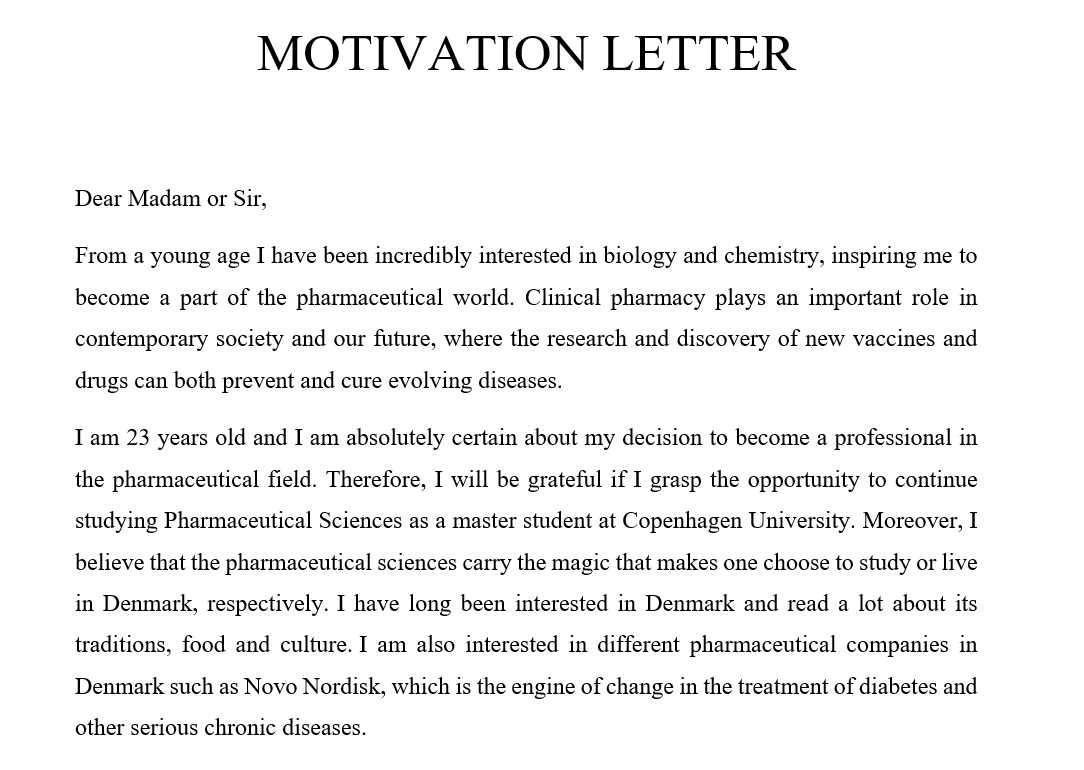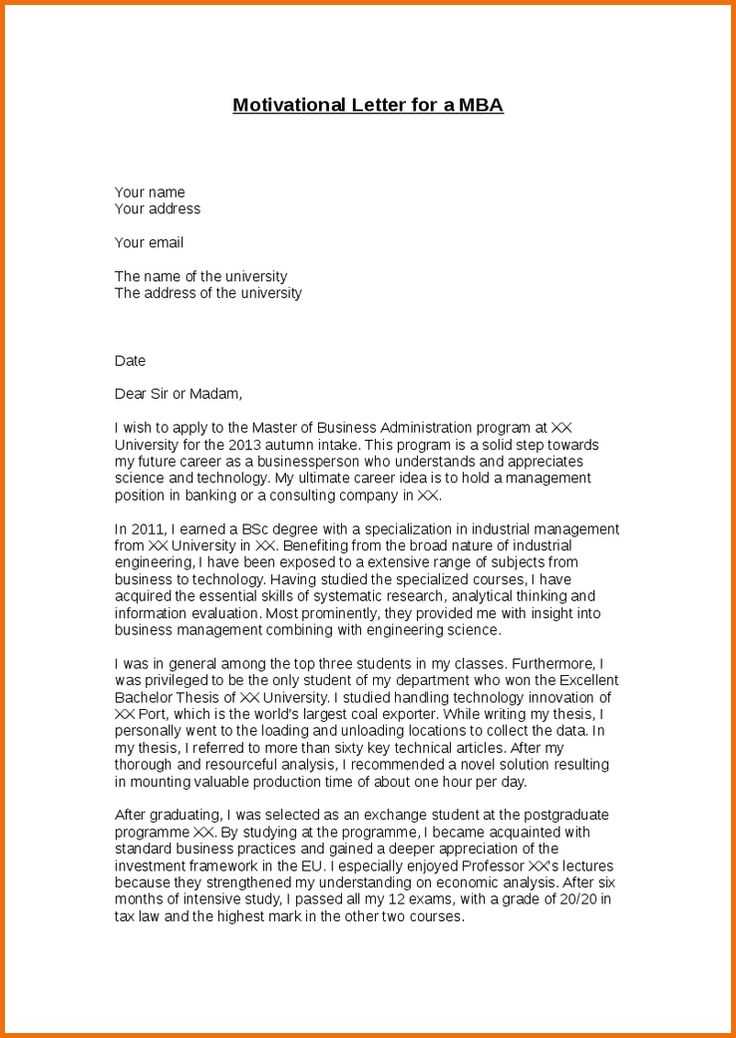Motivation letter template for university application

A strong motivation letter can make a significant impact on your university application. Tailor your letter to clearly express why you are a good fit for the program and how your background aligns with the university’s values. Start with a clear and concise opening that highlights your passion for the field and your reasons for choosing the specific institution.
Structure your letter effectively: Begin with an introduction that includes your academic background and why you’re applying. Briefly explain your professional goals and how the program will help you achieve them. Follow up with examples of your past achievements that demonstrate your suitability for the course. Make sure to connect your experiences with what the university offers, showing a clear link between your goals and the institution’s strengths.
Focus on your motivation: Be genuine in expressing your reasons for wanting to study at that particular university. Mention specific programs, professors, or opportunities that attract you. Your letter should reflect a clear understanding of the program and why it’s the right fit for your aspirations.
Conclude with confidence: Reaffirm your enthusiasm for the program and the university, and express how excited you are for the opportunity to contribute to the academic community. Keep the tone professional yet approachable, and ensure your closing leaves a positive impression.
Motivation Letter Template for University Application
Begin your motivation letter by addressing the university or program you are applying to. Use a formal greeting, such as “Dear Admissions Committee” or “Dear [University Name] Team”. This shows respect and sets a professional tone.
Introduction: Present Yourself Clearly
Start with a brief introduction of who you are, mentioning your current academic background or qualifications. Make it clear why you are interested in the program or university. For example: “I am [Your Name], a recent graduate in [Your Major], and I am applying for the [Specific Program] at [University Name] because of its strong reputation in [Field of Study].”
Main Body: Show Your Fit for the Program

In the next paragraphs, explain why you are a strong candidate. Highlight your academic achievements, experiences, and skills relevant to the program. Avoid simply listing your resume–focus on how your experiences connect to the program. For instance: “During my undergraduate studies, I developed a passion for [Subject]. My thesis on [Topic] allowed me to deepen my knowledge and explore [Specific Area]. This experience, combined with my interest in [Related Field], has led me to pursue a master’s degree in [Specific Program].”
Additionally, mention any personal qualities that make you a good fit for the program. For example, “My strong analytical skills, combined with my ability to work effectively in teams, make me confident in my ability to contribute positively to the academic environment at [University Name].”
End the main body with a statement about how you plan to contribute to the university community, either through research, extracurricular activities, or other avenues. Be specific and show genuine interest in the program.
Conclude with a professional closing statement, thanking the committee for considering your application. Sign off with a formal phrase like “Sincerely” or “Best regards,” followed by your full name.
How to Start Your Motivation Letter
Open with a clear statement of your intent. Mention the program and university you’re applying to, and briefly explain why this particular course excites you. Highlight how it aligns with your academic and career goals.
For example: “I am applying to the Master’s program in Environmental Science at XYZ University because I am passionate about sustainable practices and wish to contribute to solutions for climate change.”
Next, provide context for your application by linking your academic background or professional experiences directly to the program. Show how your past achievements have prepared you for this step.
For example: “With a bachelor’s degree in Biology and experience working on environmental research projects, I have developed a strong foundation in the core principles of sustainability.”
Avoid vague generalities; be specific about your strengths and achievements. The first paragraph sets the tone, so keep it direct and compelling.
Structuring Your Academic Background
Present your academic background clearly and concisely. Start by listing the most relevant institutions and qualifications. Use reverse chronological order, starting with the most recent degree or certification. This helps the reader quickly see your latest achievements.
Highlight Key Courses and Achievements
For each degree or certification, mention key courses or projects that directly relate to your field of study. If possible, provide evidence of academic excellence, such as high grades or awards. This shows that you not only completed the coursework but excelled in it.
Link Your Studies to Your Future Goals
Connect your academic experiences with your future aspirations. Show how the skills and knowledge gained align with the program you’re applying to. This reinforces your commitment and helps the admissions committee understand why you’re a strong fit.
Highlighting Personal Motivation for the Program

Begin by sharing what drives your interest in the program. Focus on specific aspects of the curriculum or research that excite you. Mention any relevant academic or personal experiences that shaped your decision. For example, if a particular course or project aligns with your long-term goals, explain why it’s a perfect fit for you.
Demonstrating Passion Through Actions
Go beyond expressing enthusiasm–show how your actions reflect your commitment. Discuss related experiences, such as internships, volunteer work, or personal projects, where you gained skills relevant to the program. This provides a clear picture of how you’ve actively pursued your interests and prepared for the challenges ahead.
Aligning Personal Goals with Program Offerings
Articulate how this specific program aligns with your personal and professional aspirations. Highlight any unique features of the program, such as professors, research opportunities, or specific methodologies, that resonate with your ambitions. Show that you’ve done thorough research and understand what the program offers that can help you grow in your field.
Demonstrating Fit with the University

Clearly highlight how your academic interests align with the university’s strengths. Research the programs and faculty members, then connect their work to your past experiences or future goals. Show that you are aware of specific courses, research opportunities, or student organizations that are unique to the institution and explain why they matter to you.
Describe how the university’s values and culture resonate with your personal or professional aspirations. Focus on the mission statement or any values you share, such as a commitment to diversity, innovation, or community engagement. Provide examples from your own life where you’ve demonstrated these values, making the connection clear.
| University Features | Your Experience |
|---|---|
| Research opportunities in AI | Conducted independent research on AI applications in healthcare |
| Community service initiatives | Volunteered at local shelters, organizing educational programs |
| Strong engineering program | Interned at a tech firm, working on real-world engineering projects |
Conclude by reinforcing how the university will enable you to grow professionally and academically. Make a clear case for why the university is the perfect match for your goals, rather than simply stating that it is a good option. Tailor this section to each application, emphasizing the unique qualities of each university.
Discussing Future Career Plans
Clearly outline the direction you plan to take after completing your degree. Specify the industry or field you want to enter and explain how your chosen program aligns with your professional aspirations. Mention particular skills you aim to acquire and how they will help you excel in your future role.
Be specific about the type of positions you aspire to hold and why those roles appeal to you. Reference any relevant experiences or projects that have shaped your goals. This shows you’ve thought deeply about your future and how your education fits into your plans.
Consider addressing how you plan to contribute to the sector or community, highlighting any particular challenges you are eager to tackle. Show that you understand the practical applications of your degree and how it will allow you to make a meaningful impact in your chosen field.
Polishing Your Closing Statement
Finish your letter by making a strong, clear impression. Avoid vague statements or generic expressions. Instead, be specific about your enthusiasm and goals.
Be Confident and Positive
Express confidence in your application. Show your excitement about the opportunity and highlight your readiness to contribute. A direct, optimistic tone creates a lasting impact.
End with a Call to Action
Encourage the reader to take the next step by thanking them for their time and consideration. Mention that you look forward to the possibility of further discussions or interviews.
- Example: “I am eager to discuss how I can contribute to your program.”
- Example: “Thank you for considering my application. I look forward to the opportunity to speak further.”